Codelife
Code Experience:
While I don't see myself as a programmer, I do have a computer science degree, and a solid foundation, but I rather create programmable ideas. I dabble in vibe-coding using AI tools to learn. Here are some of my mini-projects. I promise I won't bore you with "Hello World". I think we've all beent here! Haha
| IN PROGRESS |
High-school math + intro linear algebra |
| PAUSED TFN |
High-school math + intro linear algebra |
| PAUSED TFN |
High-school math + intro linear algebra |

I'm embarking on an a AI-Guided academic journey to teach myself Control Theory, Optimization, Autonomous Systems, and Large-scale Software Development. Before we begin it’s essential to define time investment, prerequisites, and disciplinary depth.
My motivation for learning Dynamic Controls are part of my passion for Formula One racing, and the precision engineering that goes into design and function.
Below is a detailed overview showing the realistic path to mastery (academic + applied), time horizons, and foundational sequence required to build end-to-end autonomy systems (like Formula Student / F1Tenth, AV/ADAS stacks, or robotics platforms).
I will create a 'Go To Dynamic Controls Educatio Room' for all the classroom matrials I work through, and I'll share my journey with you there. Let's Go!
Phased Learning
We are going to take perform condensed learning, but we won't cut any corners. Instead, where it is fundamental, we will take extra care in deeply understanding concepts detailed below.
| Phase | Duration | Focus |
|
Phase 1 |
0–6 months |
Math, Python, basic control |
| Phase 2 | 6–12 months | C++, ROS2, simple planners |
| Phase 3 | 1–2 years | Advanced control (MPC), optimization |
| Phase 4 | 2–3 years | AV/ADAS stack integration, simulation |
| Phase 5 | 3–5 years | Research + professional-level systems architecture |
Topics we'll cover are as detailed below. Have a look, and plan our learning schedule.
|
Domain |
Core Topics |
Time to Proficiency |
Time to Mastery |
Prerequisites |
|
Mathematics for Controls & Optimization |
Linear Algebra, Calculus, Differential Equations, Probability, Convex Optimization, Numerical Methods |
6–12 months |
2–3 years |
High-school math + intro linear algebra |
| IN PROGRESS |
High-school math + intro linear algebra |
|
Optimization Algorithms |
Gradient descent, interior point methods, SQP, evolutionary algorithms, constrained optimization |
6–12 months |
2–3 years |
Calculus + Linear Algebra |
| NOT STARTED |
High-school math + intro linear algebra |
|
Path Planning & Decision Making |
Graph search (A*, D*), sampling (RRT, PRM), trajectory optimization, behavior planning |
6–12 months |
2–3 years |
Basic control + optimization |
| NOT STARTED |
High-school math + intro linear algebra |
|
Software Engineering for Autonomy |
C++ (17/20), Python, design patterns, data structures, multi-threading, distributed systems |
12–18 months |
3–5 years |
CS fundamentals |
| NOT STARTED |
High-school math + intro linear algebra |
|
Robotics Frameworks (ROS/ROS2) |
Nodes, topics, services, TF, URDF, sensor integration, navigation stack |
6–12 months |
2 years |
Linux + Python/C++ |
| NOT STARTED |
High-school math + intro linear algebra |
|
Autonomous Vehicles / ADAS Stack |
Perception → Planning → Control → Simulation |
1–2 years |
4–6 years |
Robotics, control, software integration |
| NOT STARTED |
High-school math + intro linear algebra |
|
System Design & Architecture |
Middleware, CI/CD, testing, modular design, performance tuning |
1 year |
3–5 years |
Experience in large codebases |
| NOT STARTED |
High-school math + intro linear algebra |
|
Simulation & Testing |
Gazebo, Carla, AirSim, unit testing, Monte Carlo simulation |
6–12 months |
2–3 years |
ROS + Python |
| NOT STARTED |
High-school math + intro linear algebra |
